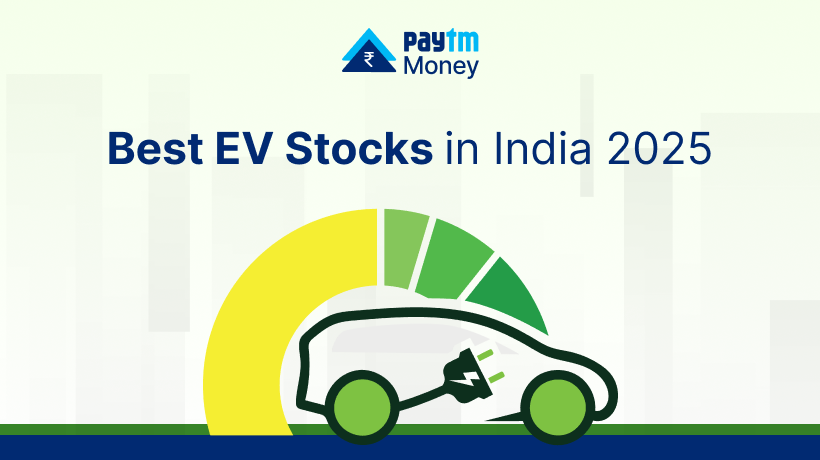Introduction
India’s electric vehicle (EV) industry is on a significant breakthrough fueled by government initiatives, rising environmental consciousness, and advancements in battery technology. As the world shifts towards sustainable mobility, India is poised to become a significant player in the global EV market. This blog explores India’s best EV stocks to invest in in 2025, highlighting the companies leading the charge in this transformative sector.
- Introduction
- Why Invest in EV Stocks?
- 1. Government Support
- 2. Environmental Benefits
- 3. Technological Advancements
- 4. Global Trends
- Best EV Stocks in India 2025
- 1. Tata Motors Limited
- 2. Mahindra & Mahindra Limited
- 3. Hero Electric
- 4. Olectra Greentech Limited
- 5. Amara Raja Batteries Limited
- 6. Exide Industries Limited
- 7. Greaves Cotton Limited
- 8. Ashok Leyland Limited
- 9. TVS Motor Company Limited
- 10. JBM Auto Limited
- Key Metrics to Evaluate EV Stocks
- 1. Market Share
- 2. R&D Investment
- 3. Production Capacity
- 4. Government Support
- Risks Associated with EV Stocks
- Conclusion
- FAQ: Best EV Stocks in India 2025
Why Invest in EV Stocks?
1. Government Support
The Indian government is heavily promoting the adoption of EVs through subsidies, tax incentives, and initiatives like the Faster Adoption and Manufacturing of Hybrid and Electric Vehicles (FAME) scheme.
2. Environmental Benefits
As pollution and climate change concerns grow, EVs present a cleaner, more sustainable alternative to traditional internal combustion engine vehicles, increasing consumer demand.
3. Technological Advancements
Continuous innovations in battery technology, charging infrastructure, and vehicle design make EVs more affordable and efficient, boosting market potential.
4. Global Trends
The global shift towards electric mobility is inevitable, and Indian companies are positioning themselves to tap into domestic and international markets.
Best EV Stocks in India 2025
1. Tata Motors Limited
Tata Motors is a pioneer in the Indian EV market, with its popular models like the Tata Nexon EV and Tigor EV.
- Market Capitalization: ₹2.5 trillion
- Growth Strategy: Expansion of the EV portfolio and investment in battery technology.
- Future Prospects: Strong market position and plans to introduce new EV models catering to different segments.
2. Mahindra & Mahindra Limited
Mahindra & Mahindra has been an early adopter in the EV space, offering a range of electric vehicles, including cars and commercial vehicles.
- Market Capitalization: ₹4 trillion
- Innovation: Focus on developing affordable EVs for the mass market.
- Strategic Edge: Leveraging its existing automotive expertise to scale EV production.
3. Hero Electric
Hero Electric is one of India’s largest electric two-wheeler manufacturers, catering to the growing demand for eco-friendly transportation options.
- Market Position: Leading player in the electric two-wheeler segment.
- Expansion Plans: Increasing production capacity and expanding the product lineup.
- Market Growth: Capitalizing on the shift towards electric mobility in urban areas.
4. Olectra Greentech Limited
Olectra Greentech is a prominent manufacturer of electric buses and is actively involved in developing EV infrastructure.
- Market Capitalization: ₹130 billion
- Strategic Initiatives: Collaboration with global partners to enhance product offerings.
- Future Potential: Benefiting from government contracts and urban transport electrification projects.
5. Amara Raja Batteries Limited
Amara Raja Batteries is a key player in battery manufacturing, producing batteries for EVs and energy storage systems.
- Market Capitalization: ₹179 billion
- Innovation: Investing in research and development to produce advanced lithium-ion batteries.
- Growth Strategy: Expanding capacity to meet the rising demand for EV batteries.
6. Exide Industries Limited
Exide Industries is one of the leading battery manufacturers in India, supplying batteries for various automotive and industrial applications.
- Market Capitalization: ₹338 billion
- Future Prospects: Strengthening its presence in the EV battery market through strategic partnerships and technology upgrades.
- Market Potential: Leveraging its brand strength and distribution network.
7. Greaves Cotton Limited
Greaves Cotton is expanding into the EV space through its subsidiary, Ampere Vehicles, which manufactures electric scooters and three-wheelers.
- Market Capitalization: ₹47 billion
- Innovation: Focus on affordable EVs for last-mile connectivity.
- Growth Potential: Increasing demand for electric three-wheelers in urban and semi-urban areas.
8. Ashok Leyland Limited
Ashok Leyland is a major player in the commercial vehicle segment, venturing into electric buses and trucks.
- Market Capitalization: ₹773 billion
- Strategic Focus: Developing a range of electric commercial vehicles to cater to public transport and logistics sectors.
- Future Growth: Benefiting from government tenders and fleet electrification initiatives.
9. TVS Motor Company Limited
TVS Motor Company has entered the EV market with its electric scooter, TVS iQube, targeting urban commuters.
- Market Capitalization: ₹1.5 trillion
- Expansion Strategy: Introducing more EV models and enhancing the charging infrastructure.
- Market Position: Strong brand loyalty and a growing EV product lineup.
10. JBM Auto Limited
JBM Auto is a rising player in the electric bus manufacturing segment, catering to public transportation needs.
- Market Capitalization: ₹147 billion
- Future Plans: Expanding production capacity and developing advanced EV models.
- Strategic Partnerships: Collaborating with global technology leaders for innovation.
Key Metrics to Evaluate EV Stocks
1. Market Share
A company’s market share in the EV segment indicates its competitiveness and ability to capture demand.
2. R&D Investment
Significant investment in research and development reflects a company’s commitment to innovation and staying ahead in the fast-evolving EV market.
3. Production Capacity
Expanding production capacity is crucial for meeting increasing demand and scaling operations effectively.
4. Government Support
Access to government incentives, subsidies, and contracts can significantly enhance a company’s financial health and market position.
Risks Associated with EV Stocks
- Regulatory Risks: Changes in government policies can affect subsidies and incentives, impacting profitability.
- Technological Changes: Rapid technological advancements may render current products obsolete.
- Market Competition: The EV market is highly competitive, with domestic and international players vying for market share.
Conclusion
The Indian EV sector is set to witness significant growth, driven by supportive government policies, technological advancements, and changing consumer preferences. Companies like Tata Motors, Mahindra & Mahindra, and Hero Electric are leading the charge in the domestic market. Investing in the best EV stocks in India offers a promising opportunity to capitalise on the sector’s expansion. By evaluating key metrics such as market share, R&D investment, and production capacity, investors can make informed decisions for long-term growth in 2025 and beyond.
FAQ: Best EV Stocks in India 2025
1. Why should I invest in EV stocks in India?
Investing in EV stocks in India offers the potential for high returns due to the growing demand for electric vehicles, government support through incentives, and the global shift towards sustainable transportation.
2. Which are the top EV stocks to invest in 2025?
Top EV stocks in India for 2025 include Tata Motors Limited, Mahindra & Mahindra Limited, Hero Electric, Olectra Greentech Limited, and Amara Raja Batteries Limited.
3. How is the Indian government supporting the EV sector?
The Indian government supports the EV sector through initiatives like the FAME scheme, tax benefits, subsidies for EV manufacturers and buyers, and investments in EV infrastructure development.
4. What factors should I consider when investing in EV stocks?
Key factors to consider include the company’s market share in the EV segment, research and development investments, production capacity, financial health, and government support or incentives.
5. What are the risks associated with investing in EV stocks?
Risks include regulatory changes, rapid technological advancements, market competition, and potential delays in infrastructure development.
6. How is technology influencing the EV sector?
Technology is driving advancements in battery efficiency, charging infrastructure, and vehicle design, making EVs more affordable, reliable, and appealing to consumers.
7. Are EV stocks a good long-term investment?
Given the industry’s growth trajectory, supportive policies, and increasing consumer demand for sustainable mobility solutions, EV stocks can be a good long-term investment.
8. What role do battery manufacturers play in the EV industry?
Battery manufacturers like Amara Raja Batteries and Exide Industries play a crucial role by producing the essential components needed for EVs, thus benefiting from the sector’s growth.
9. How can I start investing in EV stocks in India?
To start investing in EV stocks, open a brokerage account, research the companies, assess their financial and market performance, and consider consulting a financial advisor for guidance.
10. What is the future outlook for the EV industry in India?
The future outlook for the EV industry in India is positive, with expected growth driven by increased adoption, government policies, advancements in technology, and expansion of charging infrastructure.
Disclaimer: Investments in the securities market are subject to market risks, read all the related documents carefully before investing. Registration granted by SEBI, enlistment with BSE and certification from NISM in no way guarantee performance of the Research Analyst or provide any assurance of returns to investors. Paytm Money Ltd SEBI Reg No. Broking – INZ000240532, Depository Participant – IN – DP – 416 – 2019, Depository Participant Number: CDSL – 12088800, NSE (90165), BSE (6707), SEBI reg No. Research Analyst – INH000020086. Regd Office: 136, 1st Floor, Devika Tower, Nehru Place, Delhi – 110019. For complete details, please visit: https://www.paytmmoney.com






